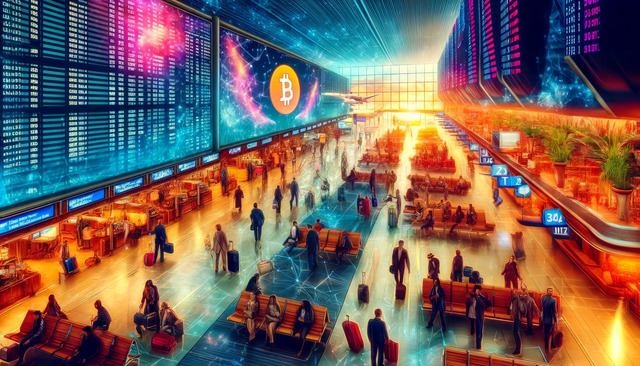How Crypto Changed the Aviation Industry
Cryptocurrencies have changed every industry in which they are used. The aviation industry wasn’t among the first to accept crypto as it was a novelty, and stability is the most important feature of aviation for both the investors and the users.
At first, crypto was only used by BTC online casinos with live dealer games or to make risky investments in novelty apps. However, once it proved itself to be relatively steady in terms of value and safe to transfer large amounts, aviation and other traditional industries quickly found many uses for cryptocurrencies and blockchain.
Aviation and Crypto Mining
Crypto mining is a process integral to many cryptocurrency networks. It has sparked interest in the aviation sector as an innovative financing mechanism. The major downside of mining is that it requires a lot of computing power and, therefore, a lot of energy. Those able to provide it are looking into a potentially lucrative investment.
The aviation industry has such computing power and the energy to sustain it since both are necessary for it to operate. The crypto industry is slowly moving away from mining, but while it still uses it, it can be a potentially lucrative partnership.
Decentralized Aircraft Marketplace
Cryptocurrency and blockchain are used to create a decentralized market for aircraft. This includes all the parties involved in creating platforms for aircraft owners, operators, lessors, and buyers. The transactions are decentralized and, therefore, can be made directly between the parties without the need for intermediaries and additional costs.
Such markets offer transparency, efficiency, and accessibility to a global network of buyers and sellers. It leads to a more competitive market and, therefore, drives down prices. When combined with the tokenization of assets, a decentralized market lowers the threshold for getting into the aviation industry.

Payments in Crypto
The simplest way to use crypto in aviation is to pay for flights. This is how most aviation companies first ventured into the industry, as it was just an extension of the already existing features. Companies started by accepting payments in Bitcoin and Ethereum and moved on to smaller altcoins once they became widely used.
Paying in crypto has many benefits for both the end-users and the aviation company. The payments are safer and faster, and there are no intermediaries, so there are no fees to pay for processing payments. The transaction records are also immutable, making it easy to spot and track mistakes.
Supply Chain Management
The aviation industry relies on complex and vast supply management systems. It’s needed to supply and manage spare parts and machinery needed to keep the planes operational and safe. Blockchain technology, which runs cryptocurrency, can also be used to streamline the aviation supply chain by providing a transparent and secure ledger for tracking parts, components, and maintenance history.
The details of all of these transactions are recorded in the blockchain code itself. Therefore, all the payments made along the way are automated as soon as the terms of the contract are met. Automating this process makes it less expensive, safer, and less prone to mistakes.
Maintenance and Repair
Maintenance and repair are essential for smooth and safe flights, and in the long run, they are the biggest expense the aviation industry has. The key to good maintenance efforts is to keep close track of all the repairs, spare parts, and components, as well as the history of the work being done.
Different companies often make such efforts, sometimes spreading all over the world, and automating the management process can save time and increase safety. Blockchain can, therefore, be used for this purpose as well since it creates an immutable record of the process.
Flight Data
Keeping records of flight data requires continuous effort on the part of the industry. The data has a role in maintaining the airplanes, but it can also help keep costs down and make sure the process isn’t wasteful whenever it’s possible.
If this information is written into the blockchain code, it becomes immutable and changes as soon as consumption changes in real-time. Such information can then be made easily available to stakeholders, including such as airlines, regulators, and maintenance providers, while still providing privacy.
Smart Contracts
Smart contracts are agreements written into the blockchain code that self-execute when the terms of it are met. They can have numerous uses within the aviation industry as it’s a complex and vast field with many moving parts.
They can automate crew rostering and scheduling agreements between airlines and crew members. It includes flight assignments, duty hours, rest periods, and compensation rates.
Smart contracts can optimize fuel supply agreements between airlines and fuel suppliers. Terms of such contracts can include fuel pricing, delivery schedules, quality standards, and payment terms.
Tokenization of Aircraft Assets
Non-fungible tokens based on blockchain are widely used to represent ownership in a variety of different industries. Since ownership over the asset is written into a blockchain, it can be fairly and safely divided, and management rights can be provided based on the percentage of ownership.
Aircraft assets can be managed and owned in this way as well, and many are already using NFTs to signify ownership over aircraft and even aviation companies. It makes ownership over those assets more democratic and creates liquidity for otherwise illiquid aviation assets. Fractal ownership such as this can also be a way for small partners to get into the industry.
Passenger Identity and Security
Passenger identity and security are among the most important concerns in the aviation industry. This is especially true now that aviation travel is less expensive and much more widely available. The goal is to make sure that passenger safety is maintained and not to violate the privacy of the passenger. With crypto payments, both goals can be attained at the same time.
Keeping the passenger data on blockchain and making payments with crypto allows the industry to streamline the check-in process, improve security screening, and reduce instances of identity fraud. In the long run, measures such as these reduce costs as fewer security expenses need to be passed on to the passengers.
Loyalty Programs
Most airlines have many different loyalty programs to reward passengers who use their services on a regular basis. These are sometimes based on the number of trips that the passenger makes and sometimes based on the miles traveled.
Blockchain can be used to manage the process and to keep it transparent and open for both the aviation company and the end users. The loyalty rewards can be automatically added to the user’s account once they meet the requirements.
To Sum Up
Cryptocurrencies are already used in a variety of industries, and the general public more widely accepts them than ever before. This includes industries such as aviation that were initially hesitant about the novel payment options. The aviation industry benefits greatly from the unique features provided by blockchain and crypto in general.
These include the speed and automation of transfers, the immutability of records, and the lack of additional costs associated with paying intermediaries. Cryptos can also improve the already existing systems, such as the maintenance process or loyalty programs, for frequent flyers.
